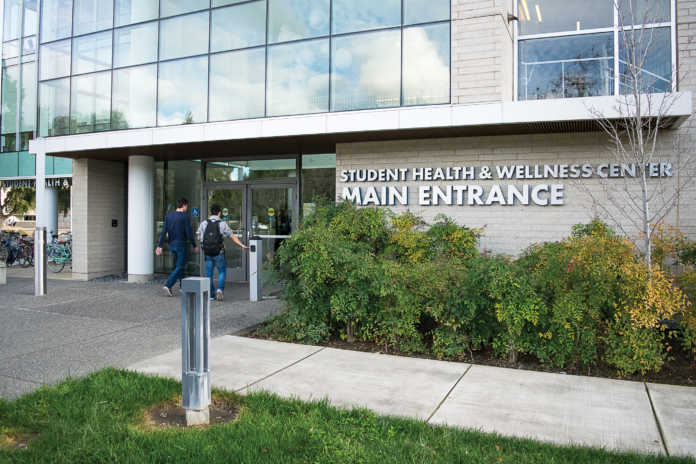Students discuss the preventive measures they take to avoid getting sick
Gesundheit! Being sick is never fun, and the prevalence of sickness during the winter, accompanied by gloomy days, early sunsets and crowded Unitrans buses full of wet umbrellas, can be particularly discouraging. A violently loud sneeze during lecture may garner a “bless you” from the professor, while during a certain midterm, sniffles seem to harmonize all around. On top of actually being sick, college students are no longer at home and find themselves with added responsibility when taking care of themselves.
Students like first-year biochemistry and molecular biology major Aparna Manoj find getting sick inconvenient. Manoj said that by constantly being surrounded by so many more people than she would be at home, it feels easier to get sick and harder to recover.
“When someone gets sick, everyone gets sick,” Manoj said. “Usually when I get sick it lasts a few days, but here it lasts [a] week, even with all the medication.”
First-year neurobiology, physiology and behavior major Palavi Lodhia agreed with this. When Lodhia was sick recently, she also found it hard to recover. Manoj tries to drink warm water and avoid cold food, something that Lodhia would have liked to do, but was unable to.
“Being at home, I have parents to help,” Lodhia said. “But here I am on my own with limited food and resources to help me recover […] the market doesn’t have vegetarian soup and I can’t drink tea, so I barely drank any warm liquids.”
Going to classes became challenging, according to Lodhia, in part due to a lack of motivation when classes are far away from the comforts of home. Students who live off campus have the added step of getting to campus and then going from class to class. Not only are there classes to stay on top of, but there are also other responsibilities, including club involvement and work obligations.
Many students try to avoid getting sick by taking precautions beforehand. For some, like second-year environmental policy analysis and planning major Liliana Jeske, this includes getting a flu shot. Lodhia generally gets an annual flu shot, but was unable to this year because of the insurance she has.
“I get [my flu shot] just to be safe and think others should too,” Lodhia said. “I only went to the Wellness Center once to try to get a flu shot, and they didn’t accept my insurance and said there was no one available to give me one regardless at the time I went. So that kind of sucked.”
The Student Health and Wellness Center can be hard to navigate as students have concerns about the UC Student Health Insurance Plan (SHIP) waiver, insurance and payment options. Neither Jeske nor Manoj have gone before, though Manoj considered it when she had a long-lasting cold.
Lodhia makes sure to hydrate and drink Emergen-C, a staple in many dorm rooms (the classic flavor of Super Orange has a distinct smell that can remind anyone of storm clouds around Tercero). When the weather is bad, she controls the amount of time that she spends outside and what she wears. Once she is sick, she tries to catch up on sleep and sometimes homework as well if she can focus on it.
Manoj, on the other hand, doesn’t typically get a flu shot. Her preventative measures are similar to Lodhia’s, and she also tries to eat healthier. She says that although “it seems kind of silly,” she sometimes just tells her body not to get sick as “a desperate measure.”
“I get all my vaccines and everything of course, because it’s important to be protected against serious illness,” Manoj said. “But if the flu doesn’t seem really abnormal, my family usually doesn’t get the flu shot.”
Manoj understands that everyone has different reasons for choosing or not choosing to get the flu shot each year, but her reasons reside in her health history.
“For me personally, it’s because I don’t get sick that often at all, and usually I don’t get the flu, but my family also kind of thinks that getting sick at times is better, ironically,” Manoj went on. “I guess the logic is to let your body really get sick and fight it off to kind of revamp your system, but of course this only applies with the common cold, not anything serious.”
Although many students try to stay on top of classwork and other responsibilities, prioritizing one’s health is important as well. And all things considered, nobody wants to get sick.
“Don’t go to class if you’re really, really sick, [especially] if you’re working with or next to other people,” Jeske said. “You don’t really want to catch what other people have.”
Of course, this advice can be more easily said than done. Many classes require a doctor’s note for absences or have strict attendance policies. Though this can prevent students more attached to their pillow than their textbooks from missing weeks of lecture, it comes at the expense of sniffly students coming to crowded classrooms and spreading what no one wants to have during finals season.
This being said, take care of yourself, and in doing so, you will be taking care of your fellow Aggies.
Written by: Anjini Venugopal — features@theaggie.org



